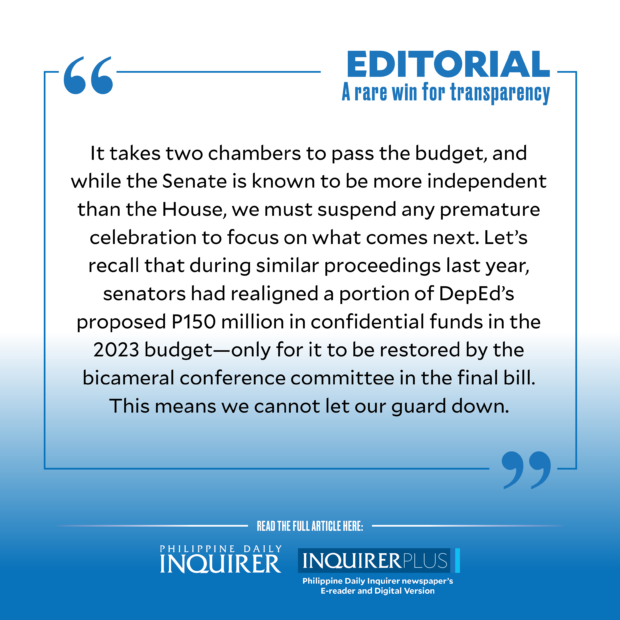Let it not be said that our lawmakers cannot be prodded, once in a while, to do the right thing. We applaud the House of Representatives, through its small committee, for realigning P1.23 billion in confidential funds in the proposed 2024 budget, including those of the Office of the Vice President (OVP) and the Department of Education (DepEd), two of the civilian agencies we have long argued have no business dipping their hands into surveillance-related outlay, let alone a whopping P650 million of it combined. Besides the two, the agriculture, foreign affairs, and information and communications technology departments are poised to lose their secret appropriations, while six other offices would see big cuts in theirs. The amounts are to be split among agencies protecting our interests in the West Philippine Sea, such as the National Intelligence Coordinating Agency, National Security Council, and Philippine Coast Guard. All well and good. This is a small but crucial victory for transparency in the use of our taxpayer money. But there’s a caveat: the Office of the President’s (OP) request for P4.56 billion in confidential and intelligence funds (CIF), by far the largest chunk in the 2024 proposal, has been left untouched by the House and the Senate, a disappointing but expected development. We continue to urge Congress to heed calls to realign this to more prudent causes, because, as Senate Minority Leader Aquilino Pimentel III rightly pointed out, President Marcos’ office better “leave [the sleuthing] to the specialists in the field of intelligence.” We must acknowledge, too, that the House leaders’ decision to redistribute part of the controversial funds didn’t spring from the goodness of their hearts. Rather, it was a calculated response to the clamor of opposition lawmakers, activists, opinion leaders, and other critics who deserve credit for this rare bipartisan chorus. But as they say, it ain’t over till the fat lady sings. It takes two chambers to pass the budget, and while the Senate is known to be more independent than the House, we must suspend any premature celebration to focus on what comes next. Let’s recall that during similar proceedings last year, senators had realigned a portion of DepEd’s proposed P150 million in confidential funds in the 2023 budget—only for it to be restored by the bicameral conference committee in the final bill. This means we cannot let our guard down, as the real bargaining occurs at this penultimate stage of the budget cycle, testing the fiscal mettle and political will of our election-minded lawmakers. Beyond legislative wrangling, however, there’s more urgent work to be done, particularly in crafting a broad policy against the indiscriminate allocation of CIF. CIF use must be restricted to a small number of agencies with legitimate surveillance and intelligence-gathering requirements, as Albay Rep. Edcel Lagman has proposed. One way to do this is by enacting a law preventing the abuse of secret funds. Another is by strengthening the 2015 joint circular on the release and reporting of CIF, the only official document that lends a semblance of accountability to these hard-to-audit expenses. Let’s not forget the pledge of congressional leaders to examine past and current CIF spending. The OP, especially, must not be exempt from such scrutiny, and neither should the OVP and DepEd. In earlier budget hearings, Vice President Sara Duterte repeatedly said she was leaving it to the wisdom of Congress to decide her CIF share. But as the political tides turned, VP Duterte changed her tune last week, saying the funds were critical to security: “Whoever opposes confidential funds is opposed to peace. Whoever is opposed to peace is an enemy of the people.” By labeling her critics as foes, the country’s No. 2 official sidetracked the conversation from one about judicious use of public funds to another about partisanship and politics. The trouble with VP Duterte’s rhetoric, eerily reminiscent of her father’s, is there’s nothing in her job description, as vice president or as education secretary, that remotely requires CIF, of which she already received P125 million in the last days of 2022 and is allocated P650 million this year. Your subscription could not be saved. Please try again. Your subscription has been successful. While security is a valid concern in schools, as she argues, other funding sources are available to DepEd, which will still enjoy one of the biggest budgets next year. Even former president Rodrigo Duterte’s suggestion that CIF be used for the revival of student military training makes no sense, because an appropriation of that nature should not be confidential and would get its own line item, and neither DepEd nor OVP has the authority to spend it anyway. Thus, despite VP Duterte’s protestations, Filipinos are well within their right to oppose CIF use by civilian agencies, including hers. To say they are the people’s enemy for demanding accountability in government expenditure betrays a fundamental constitutional principle—that public office is a public trust.
Denial of responsibility! Vigour Times is an automatic aggregator of Global media. In each content, the hyperlink to the primary source is specified. All trademarks belong to their rightful owners, and all materials to their authors. For any complaint, please reach us at – [email protected]. We will take necessary action within 24 hours.


